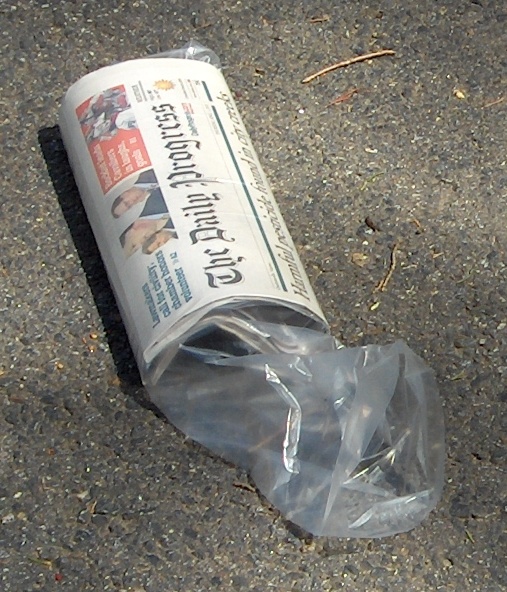
As Thanksgiving approaches, I usually take a little time to think about who and what I’m thankful for and express my. That seems to be the point, after all. This year, for various reasons, my thoughts and appreciation turn toward journalists, newspapers, and other news media.
Sometimes the people and institutions we rely on to keep us informed get a bad rap, and sometimes they deserve it.
When the Washington Post and New York Times act more as stenographers for the political class than reporters of the facts, we all lose.
When trusted (by their particular partisan audiences, anyway) sources of information like Tucker Carlson and Rachel Maddow who pretend to seriousness but then answer defamation suits with the “Alex Jones” defense — that they’re just entertainers whose statements are hyperbole and should never be relied on as factually accurate — they embarrass an honorable and worthy profession. Even mere “opinion journalists” (like myself) should operate from a respect for fact and truth.
But the Post, the Times, Fox/Carlson, and MSNBC/Maddow aren’t the institutions and journalists I’m thinking of in expressing thanks.
I’m thinking — of course! — of whistle-blower journalists like Julian Assange and foreign correspondents like Danny Fenster, cooling their heels in cells for bringing us the truth. And of the many journalists killed, accidentally or purposely, “in the line of duty” while covering wars and investigating crimes.
More than that, though, I’m thinking of America’s local and community newspapers, the dailies and weeklies scattered across the country which continue to do the job of keeping us informed and bringing us together (or at least facilitating our arguments). And, of course, the fine people who write and edit those publications.
Yes, I’m biased: I got my start in “hard,” just the facts, ma’am journalism more than 40 years ago, writing club notices for publication in my hometown daily, the Lebanon, Missouri Daily Record. I moved on to my junior high, high school, and college papers, long before eventually finding my perch in opinion/advocacy journalism.
If you know how your local high school athletes are making out, or which local church is hosting an ice cream social, or which local hero had a birthday or went to the hospital, thank your local paper. If you know what your neighbors think about a pending bond issue or local scandal, thank that paper’s letters editor.
America’s local dailies and weeklies are supposedly dying. At the very least, many have moved entirely online or cut down the size and frequency of their print editions.
That’s sad. We need them, and we should appreciate them. They’re a key ingredient in the glue that holds us together, part of the mix that constitutes what Thomas Paine called “so celestial an article as freedom.” Discussing our problems may not solve them, but not discussing them certainly won’t. A free press is still largely where the productive substance of such discussions happens.
This Thanksgiving, please spare a moment of thanks (and perhaps a subscription check!) for your local newspaper of choice.
Thomas L. Knapp (Twitter: @thomaslknapp) is director and senior news analyst at the William Lloyd Garrison Center for Libertarian Advocacy Journalism (thegarrisoncenter.org). He lives and works in north central Florida.
PUBLICATION HISTORY
- “When giving thanks, don’t forget your local newspaper,” by Thomas L. Knapp, Delaware County, Pennsylvania Daily Times, 11/20/21
- “When giving thanks, don’t forget your local newspaper,” by Thomas L. Knapp, Chester County, Pennsylvania Daily Local News, 11/20/21
- “When giving thanks, don’t forget your local newspaper,” by Thomas L. Knapp, Pottstown, Pennsylvania Mercury, 11/20/21
- “When giving thanks, don’t forget your local paper,” by Thomas L. Knapp, Wake Forest, North Carolina Wake Weekly, 11/21/21
- “When giving thanks, don’t forget your local paper,” by Thomas L. Knapp, Smithfield, North Carolina Johnstonian News, 11/21/21
- “When giving thanks, don’t forget your local paper,” by Thomas L. Knapp, Butner-Creedmoor, North Carolina News, 11/21/21
- “When giving thanks, don’t forget your local paper,” by Thomas L. Knapp, Hope, North Carolina Enterprise, 11/21/21
- “When giving thanks, don’t forget your local paper,” by Thomas L. Knapp, Wilson, North Carolina Times, 11/21/21
- “Give thanks to your local paper,” by Thomas L. Knapp, Palos Heights, Illinois Reporter, 11/21/21
- “When Giving Thanks, Don’t Forget Your Local Paper,” by Thomas L. Knapp, OpEdNews, 11/21/21
- “When giving thanks, don’t forget your local paper,” by Thomas L. Knapp, Miles City, Montana Star, 11/22/21
- “When giving thanks, don’t forget your local paper,” by Thomas L. Knapp, Elizabethton, Tennessee Star, 11/23/21
- “When giving thanks, don’t forget your local paper,” by Thomas L. Knapp, Newton, Iowa Daily News, 11/23/21
- “Being informed is great blessing,” by Thomas L. Knapp, Hammond, Louisiana Daily Star, 11/24/21
- “When giving thanks, don’t forget your local newspaper,” by Thomas L. Knapp, Sterling Heights, Michigan News-Herald, 11/27/21


